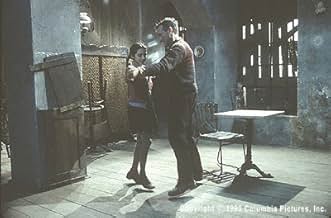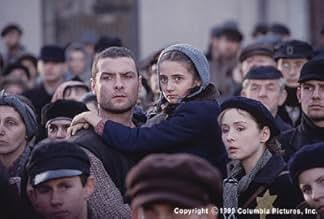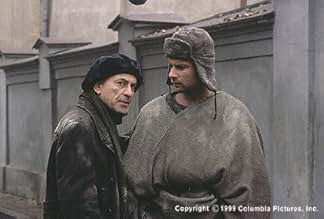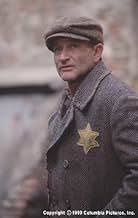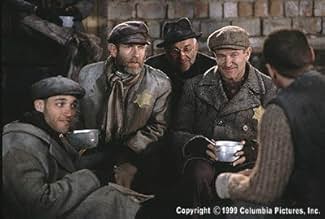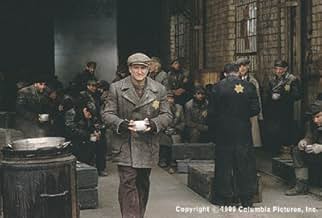During World War II, an ordinary inhabitant of a ghetto fakes news about Allied offensives to inspire hope for other victims of the Nazi regime.During World War II, an ordinary inhabitant of a ghetto fakes news about Allied offensives to inspire hope for other victims of the Nazi regime.During World War II, an ordinary inhabitant of a ghetto fakes news about Allied offensives to inspire hope for other victims of the Nazi regime.
- Awards
- 2 wins & 3 nominations total
Éva Igó
- Lina's Mother
- (as Eva Igo)
István Bálint
- Lina's Father
- (as Istvan Balint)
János Gosztonyi
- Samuel
- (as Janos Gosztonyi)
Ádám Rajhona
- The Whistler
- (as Adam Rajhona)
Péter Rudolf
- Roman
- (as Peter Rudolf)
- Director
- Writers
- All cast & crew
- Production, box office & more at IMDbPro
Storyline
Did you know
- TriviaThis movie and its 1974 predecessor were both based on the novel "Jakob der Lügner", written in 1969 by the East German author Jurek Becker. As Jews, Becker and his parents were placed in a Polish Ghetto in 1939. In order to save him from deportation, his parents gave the Germans a false birth date; Becker forgot his real birth date and was never able to discover it later in life. Although he was eventually sent to the concentration camps Ravensbrück and Sachsenhausen, both he and his father survived the war; his mother died of malnutrition after being freed from the camp. His novel "Jakob der Lügner" won the Heinrich-Mann Prize for literature in 1971; Becker died in 1997 of cancer.
- GoofsThe train locomotive in the lower left-hand corner of the DVD cover artwork is correct for southern California when the movie was released in 1999, but it's totally wrong for the movie's setting in 1944 Poland. Its cab profile was used on various diesel-electric models built by General Motors for the North American market from the early 1960s onwards, it has 1990s-style dual low-mounted safety lights, and its red-and-gray paint scheme bears an uncanny resemblance to that used by the Southern Pacific Railroad in the western United States in the late 20th century.
- Quotes
[first lines]
Jakob Heym: Hitler goes to a fortune-teller and asks, "When will I die?" And the fortune-teller replies, "On a Jewish holiday." Hitler then asks, "How do you know that?" And she replies, "Any day you die will be a Jewish holiday."
- Crazy creditsSpecial thanks to the city and peoples of Piotrków, Poland, the city and peoples of Lódz, Poland and the city and peoples of Budapest, Hungary.
- ConnectionsFeatured in Siskel & Ebert: American Beauty/Blue Streak/For Love of the Game (1999)
- SoundtracksBeer Barrel Polka (Roll Out The Barrel)
Written by Lew Brown, Wladimir A. Timm (as Wladimir Timm), Jaromir Vejvoda & Vasek Zeman
Performed by The Andrews Sisters
Courtesy of MCA Records
By Arrangement with Universal Music Special Markets
Featured review
Over the years, I have found Robin Williams to be one of the most frustrating actors around. Clearly loaded with talent, in my opinion at least most of his movies have been disappointments. He either gives unnecessarily over-the-top performances that really don't fit the context, or he controls his natural comedic instincts to the point at which he comes across as uninspired. So I wasn't sure what to expect in "Jakob the Liar." What I found was a surprisingly good performance in a wonderful movie.
Williams plays Jakob Heym, confined to the Jewish Ghetto of Warsaw by the Nazis during the Second World War. With hope fading, Heym accidentally discovers that Russian troops aren't far away, and begins to spread the news. Others become convinced that he has a radio hidden, and Heym's fictional "news reports" from the BBC provide enough hope to keep the residents of the Ghetto going through this dark time.
Williams (also executive producer) did a fine job as Heym. As one would expect, his character comes across as something of a comedian ("I believe we're God's Chosen People; I just wish He had chosen someone else!") but his humour is appropriate; the sort of dark humour one would expect from people in this situation. The other performances faded into the background, not because they were bad but because Williams so dominated the movie. Special mention should go to Justus von Dohnanyi, though, who played the Nazi Commandant "Preuss." Dohnanyi manages to capture exactly the sort of slimy, inhuman character one would expect to be put in charge of such a business. The rest of the cast (primarily Hannah Taylor-Gordon as Lina and Liev Schreiber as Mischa) are good, but overshadowed by Williams.
The character of Kirschbaum (played by Armin Mueller-Stahl) filled me with sadness and represents a clear statement of the evils of Nazism. A world-famous cardiologist, Kirschbaum, because he is Jewish, is forbidden to practice medicine, and ends up cleaning toilets. Mueller-Stahl plays the character with a quiet dignity, and next to Williams is the clear highlight of the movie.
This movie represents a wonderful testimony to the importance of hope in helping people see themselves through what must seem to be impossible situations. Although fictional, it is an important movie for those with an interest in the events of this era.
7/10
Williams plays Jakob Heym, confined to the Jewish Ghetto of Warsaw by the Nazis during the Second World War. With hope fading, Heym accidentally discovers that Russian troops aren't far away, and begins to spread the news. Others become convinced that he has a radio hidden, and Heym's fictional "news reports" from the BBC provide enough hope to keep the residents of the Ghetto going through this dark time.
Williams (also executive producer) did a fine job as Heym. As one would expect, his character comes across as something of a comedian ("I believe we're God's Chosen People; I just wish He had chosen someone else!") but his humour is appropriate; the sort of dark humour one would expect from people in this situation. The other performances faded into the background, not because they were bad but because Williams so dominated the movie. Special mention should go to Justus von Dohnanyi, though, who played the Nazi Commandant "Preuss." Dohnanyi manages to capture exactly the sort of slimy, inhuman character one would expect to be put in charge of such a business. The rest of the cast (primarily Hannah Taylor-Gordon as Lina and Liev Schreiber as Mischa) are good, but overshadowed by Williams.
The character of Kirschbaum (played by Armin Mueller-Stahl) filled me with sadness and represents a clear statement of the evils of Nazism. A world-famous cardiologist, Kirschbaum, because he is Jewish, is forbidden to practice medicine, and ends up cleaning toilets. Mueller-Stahl plays the character with a quiet dignity, and next to Williams is the clear highlight of the movie.
This movie represents a wonderful testimony to the importance of hope in helping people see themselves through what must seem to be impossible situations. Although fictional, it is an important movie for those with an interest in the events of this era.
7/10
- How long is Jakob the Liar?Powered by Alexa
Details
Box office
- Budget
- $45,000,000 (estimated)
- Gross US & Canada
- $4,956,401
- Opening weekend US & Canada
- $2,056,647
- Sep 26, 1999
- Gross worldwide
- $4,956,401
Contribute to this page
Suggest an edit or add missing content




